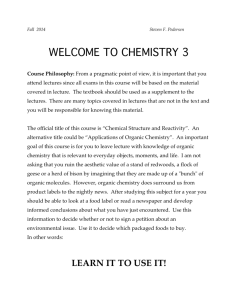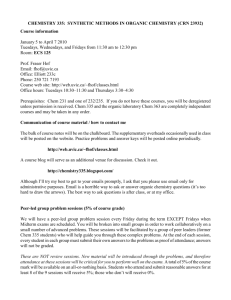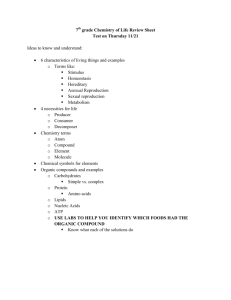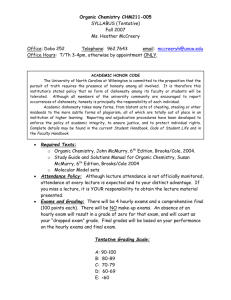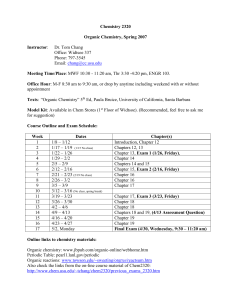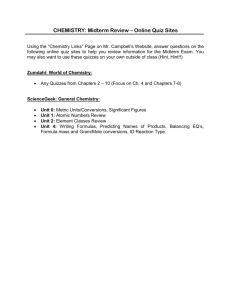Syllabus - Classie Syllabus Explorer
advertisement
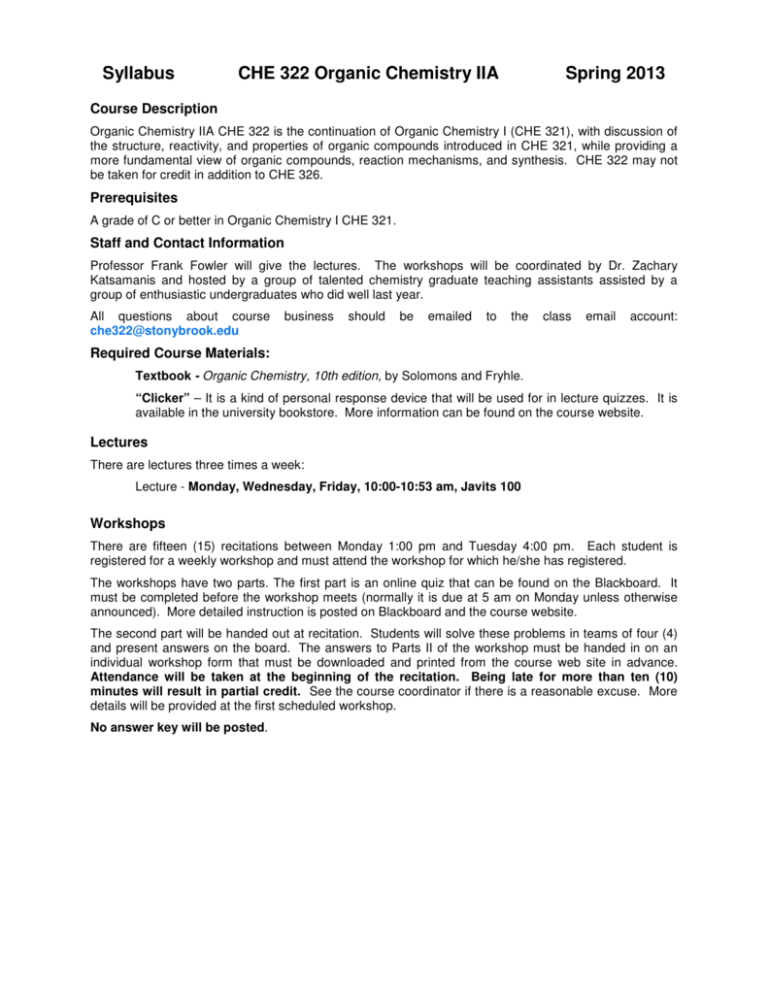
Syllabus CHE 322 Organic Chemistry IIA Spring 2013 Course Description Organic Chemistry IIA CHE 322 is the continuation of Organic Chemistry I (CHE 321), with discussion of the structure, reactivity, and properties of organic compounds introduced in CHE 321, while providing a more fundamental view of organic compounds, reaction mechanisms, and synthesis. CHE 322 may not be taken for credit in addition to CHE 326. Prerequisites A grade of C or better in Organic Chemistry I CHE 321. Staff and Contact Information Professor Frank Fowler will give the lectures. The workshops will be coordinated by Dr. Zachary Katsamanis and hosted by a group of talented chemistry graduate teaching assistants assisted by a group of enthusiastic undergraduates who did well last year. All questions about course che322@stonybrook.edu business should be emailed to the class email account: Required Course Materials: Textbook - Organic Chemistry, 10th edition, by Solomons and Fryhle. “Clicker” – It is a kind of personal response device that will be used for in lecture quizzes. It is available in the university bookstore. More information can be found on the course website. Lectures There are lectures three times a week: Lecture - Monday, Wednesday, Friday, 10:00-10:53 am, Javits 100 Workshops There are fifteen (15) recitations between Monday 1:00 pm and Tuesday 4:00 pm. Each student is registered for a weekly workshop and must attend the workshop for which he/she has registered. The workshops have two parts. The first part is an online quiz that can be found on the Blackboard. It must be completed before the workshop meets (normally it is due at 5 am on Monday unless otherwise announced). More detailed instruction is posted on Blackboard and the course website. The second part will be handed out at recitation. Students will solve these problems in teams of four (4) and present answers on the board. The answers to Parts II of the workshop must be handed in on an individual workshop form that must be downloaded and printed from the course web site in advance. Attendance will be taken at the beginning of the recitation. Being late for more than ten (10) minutes will result in partial credit. See the course coordinator if there is a reasonable excuse. More details will be provided at the first scheduled workshop. No answer key will be posted. Learning Objectives in Organic Chemistry Two fundamental learning objectives of organic chemistry are following: 1. The knowledge of organic chemistry. That is, what we currently know about the structure, dynamics and synthesis of different molecular entities and how this knowledge is interpreted in terms of modern theories. This is the stuff or facts of organic chemistry. 2. The application of the above knowledge to the solution of complex problems in organic chemistry. This is a more important learning objective because problem solving skills developed in organic chemistry can be transferred to problem solving in other fields such as medicine. Two other learning objectives of organic chemistry introduced in the course but not explicitly evaluated on exams are following: 3. The role organic chemistry has played in the development of our modern society. 4. The development of team skills to solve complex problems. Exam questions for evaluating learning objectives 1 and 2. Learning Objective 1. The knowledge of organic chemistry is often evaluated using multiple choice questions such as the following: (a) Choose the order that has the following structures (compounds) correctly arranged with respect to some physical of chemical property such as boiling point, solubility, acidity, reactivity, etc. (b) Choose the major product of the following reaction. (c) Choose the reactant and reagents that would give the following compound. (d) Choose the compound most consistent with the following data. The knowledge of organic chemistry is also evaluated using short answer questions. An advantage of the short answer questions is that they require a written answer rather than a selection from a list. Some examples are the following: (a) Give the major product of the following reaction. (b) Give reactants and reagents for performing the following transformation. (c) Give the correct name (structure) of the following structure (name). Learning Objective 2. The application of the knowledge of organic chemistry to the solution of complex problems must be accomplished using written rather than multiple choice questions. Common questions are the following: (a) Give the structures of compounds A-E consistent with the following observations. (b) Using the curved arrow formalism show how the bond making and bond breaking occurs in the following transformation. This (c) Show how the following compound could be prepared from reactants and reagents containing four carbon atoms or less. This problem develops skills of working a problem backwards. Schedule (tentative) Workshop Lecture Exam Chapter 13 WS1 – Conjugated Molecules Chapters 13-14 WS2 – The Diels-Alder Reaction Chapters 14-15 WS3 – Aromaticity Chapter 15 WS4 – Electrophilic Substitution Special Topic G Aromatic Chapter 16 WS5 – Organometallics Chapters 16-17 WS6 – Aldehydes and Ketones I Chapters 17-18 WS7 – Carboxylic Derivatives Chapters 18-19 WS8 – Aldehydes and Ketones II (Enols and Enolates) Chapter 19 WS9 – Conjugate Addition Chapter 20 WS10 – Amines Chapter 21 WS11 – Phenols and Aryl Halides Chapter 22 WS12 – Carbohydrates Chapter 23 WS13 – Lipids TBD WS14 – TBD Acids Midterm exam 1 on Wednesday, Feb. 20, 8:45-10:15 pm. and Midterm exam 2 on Wednesday, Apr. 3, 8:45-10:15 pm. Midterm exam 3 on Wednesday, May 1, 8:45-10:15 pm. Final exam on Tuesday, May 21, 8:00-10:45 am. Homework Assignments The answers to the problems in the textbook can be found on the class Blackboard account. Quizzes There will be regular daily quizzes in the lecture. We will use CPS clickers to record your in class responses. It is your responsibility to acquire a clicker from the bookstore and to register it through the Blackboard site. Under no circumstances can you use any clicker other than the one registered by you on Blackboard. Improper use of clickers will be reported to the Academic Judiciary. Exams There will be three (3) midterm exams and one final exam (the dates are given in the schedule). Exams will be based on the content of lectures and the textbook chapters, and modeled after the problem sets, workshops, and quizzes. The questions will be a mix of multiple choice and short answers. You will be allowed to bring to each exam one 5" x 8" note card. All of the material on this card must be hand written. No Xeroxed cards will be allowed. The cards will be collected at the end of the exam. Any student who violates this privilege will be charged with academic dishonesty. Model sets will be allowed at the exams. Calculators will not be allowed. If a student is unable to follow the above procedure of taking all of the exams then an alternate procedure will be used to evaluate a student's knowledge of the course material. There are no make-up exams for the three midterm exams. If one of the exams is missed a zero will be assigned. Exceptions to this policy will only be granted if the student immediately submits an acceptable excuse. If an excuse is accepted then the performance on the final will be substituted for the missed exam. All students must take a final exam. If a student misses the final exam and has an acceptable excuse then the student will be allowed to take the make-up final exam. Any student missing the final exam must notify the instructor within 48 hours in order to be eligible for the make-up exam. The make-up final exam is all essay questions and may have oral questions. The make-up exam is primarily used to determine whether or not the student deserves the grade indicated by the three exams. The make-up final cannot be used to raise a student’s grade above that indicated by the midterm exams. Although extraordinary care is taken to assure an error free process, errors may occur. For errors in exam grading, please file the regrade request form which can be obtained from the chemistry main office and email the class email account with the subject “Regrade – Student’s Name and Course ID”. If you believe there are any errors in your record, email the class email account immediately. It is important that we have a written record of your complaint. Grades There are a total of 600 points possible in the course: • Each midterm exam will be worth 100 points. • The final exam will be worth 180 points. • There will be many clicker quizzes. You can earn a total of 60 quiz points towards your final grade. • There are 14 workshops: each workshop will be worth 5 points. You can earn a total of 60 workshop points. There will be no make-up quizzes or workshops. Your grade will be determined from the percent of 600 points you earned using the following scheme. Points 0 240 276 300 372 390 444 480 504 540 Grade F D D+ C C+ B- B B+ A- A Problem of the Day Each day of the week a new synthesis problem will be posted on the course web site. The course calendar page will show a listing of past problems. Solutions to these problems will not be posted, but students are encouraged to post answers using the Blackboard Discussion Board. Doing the Problem of the Day on a regular basis may help you on the exams. Extra Help We provide considerable help to all students taking the course. You should attend all three lectures each week and your assigned workshop. You should also take full advantage of the TAs' office hours held in the Chemistry Learning center. Before each exam the TAs will offer special review sessions. If you take advantage of all of these opportunities and if you complete all the reading and homework assignments you should do fine on the exams. If you feel you need additional help there are various independent tutoring services available. You may wish to check out these various services. However, none of these services are endorsed by us and you should never assume that can use a paid tutor as a substitute for hard work. Course Web Site The course web site (http://www.ic.sunysb.edu/Class/orgchem/che322/) should be checked on a regular basis. The Problem of the Day, reading and homework assignments, course announcements, lecture notes and various other course materials can be found there. Old exams will be posted. Using the University ID number the student can print individual workshop forms. After each exam the exam results will be posted there, too. Responsibilities Each student is responsible for knowing all procedures and course expectations detailed in this document, in other handouts, on the course web site or those announced in lecture. Failure to attend a lecture is not an excuse for not knowing what was presented or announced. If you miss a lecture it is your responsibility to find out what transpired from a fellow student, or from your lecturer. Academic Integrity Each student must pursue his or her academic goals honestly and be personally accountable for all submitted work. Representing another person's work as your own is always wrong. Faculty are required to report any suspected instance of academic dishonesty to the Academic Judiciary. For more comprehensive information on academic integrity, including categories of academic dishonesty, please refer to the academic judiciary website at http://www.stonybrook.edu/uaa/academicjudiciary/. Each student must take each exam independently with no assistance from any other student and without the aid of any unauthorized materials or electronic devices. Deviations from this standard will result in a course grade of F and a report to the Academic Judiciary. Disability Support Services (DSS) If you have a physical, psychological, medical, or learning disability that may impact your course work, please contact Disability Support Services (631) 632-6748 or http://studentaffairs.stonybrook.edu/dss/. They will determine with you what accommodations are necessary and appropriate. All information and documentation is confidential. Students who require assistance during emergency evacuation are encouraged to discuss their needs with their professors and Disability Support Services. For procedures and information go to the following website: http://www.stonybrook.edu/ehs/fire/disabilities/asp. Critical Incident Management Stony Brook University expects students to respect the rights, privileges, and property of other people. Faculty are required to report to the Office of Judicial Affairs any disruptive behavior that interrupts their ability to teach, compromises the safety of the learning environment, and/or inhibits students' ability to learn.
